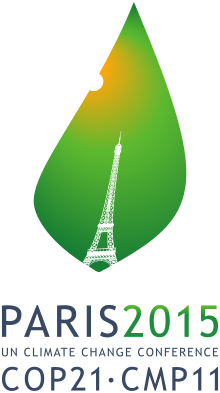 | |
| Date | 30 November 2015– 12 December 2015 |
|---|---|
| Location | Le Bourget in the suburbs of Paris, France |
| Also known as | COP21 (UNFCCC) CMP11 (Kyoto Protocol) |
| Participants | Parties to the UNFCCC |
| Previous event | ← Lima 2014 |
| Next event | Marrakech 2016 → |
| Website | Venue site UNFCCC site |
The 2015 United Nations Climate Change Conference, COP 21 or CMP 11 was held in Paris, France, from 30 November to 12 December 2015.[1] It was the 21st yearly session of the Conference of the Parties (COP) to the 1992 United Nations Framework Convention on Climate Change (UNFCCC) and the 11th session of the Meeting of the Parties (CMP) to the 1997 Kyoto Protocol.[2]
The conference negotiated the Paris Agreement, a global agreement on the reduction of climate change, the text of which represented a consensus of the representatives of the 196 attending parties.[3] The agreement was due to enter into force when joined by at least 55 countries which together represented at least 55 percent of global greenhouse gas emissions.,[4][5][6] a target reached on 4 November 2016.[7] On 22 April 2016 (Earth Day), 174 countries signed the agreement in New York,[8] and began adopting it within their own legal systems (through ratification, acceptance, approval, or accession).
According to the organizing committee at the outset of the talks,[9] the expected key result was an agreement to set a goal of limiting global warming to "well below 2 °C" Celsius compared to pre-industrial levels. The agreement calls for zero net anthropogenic greenhouse gas emissions to be reached during the second half of the 21st century. In the adopted version of the Paris Agreement,[4] the parties will also "pursue efforts to" limit the temperature increase to 1.5 °C.[3] The 1.5 °C goal will require zero emissions sometime between 2030 and 2050, according to some scientists.[3]
Prior to the conference, 146 national climate panels publicly presented a draft of national climate contributions (called "Intended Nationally Determined Contributions", INDCs). These suggested commitments were estimated to limit global warming to 2.7 °C by 2100.[10] For example, the EU suggested INDC is a commitment to a 40 percent reduction in emissions by 2030 compared to 1990.[11] The agreement establishes a "global stocktake" which revisits the national goals to "update and enhance" them every five years beginning 2023.[4] However, no detailed timetable or country-specific goals for emissions were incorporated into the Paris Agreement – as opposed to the previous Kyoto Protocol.
A number of meetings took place in preparation for COP21, including the Bonn Climate Change Conference, 19 to 23 October 2015, which produced a draft agreement.[12]
- ^ Jepsen, Henrik; et al. (2021). Negotiating the Paris Agreement: The Insider Stories. Cambridge University Press. ISBN 9781108886246. Archived from the original on 2022-12-10. Retrieved 2022-12-10.
- ^ "19th Session of the Conference of the Parties to the UNFCCC". International Institute for Sustainable Development. Archived from the original on 2013-02-13. Retrieved 2013-02-20.
- ^ a b c Sutter, John D.; Berlinger, Joshua (2015-12-12). "Final draft of climate deal formally accepted in Paris". CNN. Cable News Network, Turner Broadcasting System, Inc. Archived from the original on 2015-12-12. Retrieved 2015-12-12.
- ^ a b c Cite error: The named reference
FCCC_CP_2015_L9_Rev1was invoked but never defined (see the help page). - ^ The Editorial Board (2015-11-28). "What the Paris Climate Meeting Must Do". The New York Times. Archived from the original on 2015-11-29. Retrieved 2015-11-28.
- ^ Borenstein, Seth (2015-11-29). "Earth is a wilder, warmer place since last climate deal made". Archived from the original on 2015-12-02. Retrieved 2015-11-29.
- ^ Yeo, Sophie (2016-10-06). "Explainer: Paris Agreement on climate change to 'enter into force'". Carbon Brief. Archived from the original on 2021-05-08. Retrieved 2021-05-08.
- ^ Pamela Falk (2016-04-22). "U.S. joins 174 nations to sign hard-won climate pact". CBSNEWS. Archived from the original on 2016-10-26. Retrieved 2016-11-09.
- ^ What is COP21? Archived 10 December 2015 at the Wayback Machine access date 30 November 2015
- ^ New UN Report Synthesizes National Climate Plans from 146 Countries Archived 8 December 2015 at the Wayback Machine, UNFCCC 30 October 2015
- ^ "Intended Nationally Determined Contribution of the EU and its Member States" (PDF). UNFCCC. 2015-03-06. Archived from the original (PDF) on 2015-10-10.
- ^ "Bonn Climate Change Conference". United Nations Framework Convention on Climate Change. October 2015. Archived from the original on 2016-01-23. Retrieved 2015-12-15.